US Designates Iran, China For Concern Over Religious Freedom
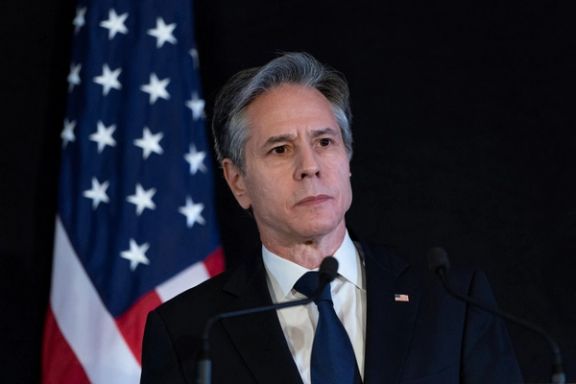
The United States on Friday designated China, Iran and Russia, among others, as countries of particular concern under the Religious Freedom Act over severe violations.

The United States on Friday designated China, Iran and Russia, among others, as countries of particular concern under the Religious Freedom Act over severe violations.
US Secretary of State Antony Blinken in a statement said those designated as countries of particular concern - which also include North Korea and Myanmar - engaged in or tolerated severe violations of religious freedom.
"Around the world, governments and non-state actors harass, threaten, jail, and even kill individuals on account of their beliefs," Blinken said in the statement.
"The United States will not stand by in the face of these abuses."
He added that Washington would welcome the opportunity to meet with all governments to outline concrete steps for removal from the lists.
Washington has increased pressure on Iran over the brutal crackdown on protesters. Women have waved and burned headscarves - mandatory under Iran's conservative dress codes - during the demonstrations that mark one of the boldest challenges to the Islamic Republic since the 1979 revolution.
The United Nations says more than 300 people have been killed so far and 14,000 arrested in protests.
United Nations experts have also called on Iran to stop persecution and harassment of religious minorities and end the use of religion to curtail the exercise of fundamental rights.
The Baha’i community is among the most severely persecuted religious minorities in Iran, with a marked increase in arrests and targeting this year, part of what the UN experts called broader policy of targeting dissenting beliefs or religious practices, including Christian converts and atheists.
Reporting by Reuters
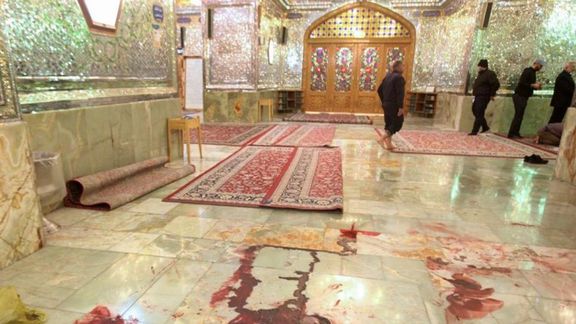
Hacked documents recently released have cast serious doubts on the official account of a terrorist attack on a shrine in Iran last month which claimed 15 victims.
The documents are several reports prepared by the IRGC’s media arm, Fars news agency, which were marked “top secret” indicate that the author believed at least parts of Iran's several intelligence organizations had knowledge of an imminent terrorist attack but did not take any action to stop it.
The documents were acquired by the hactivist group Black Reward recently which provided them to the media. These include both hearsay and excerpts from various media outlets on important political issues.
One of the reports says information provided by a Syrian group, Iran’s intelligence ministry had arrested three Taliban members who were planning terrorist operations on Shiite shrines.
The date of the arrest is not mentioned in the report which was written in the aftermath of the attack on Shahcheragh shrine in Shiraz on October 26.
Hours after the attack, Reuters quoted a statement from an ISIS telegram channel saying that the group claimed responsibility. ISIS also released a statement through its affiliated Amaq news agency and said one of its members had targeted groups of Shiite “infidels inside the shrine.”
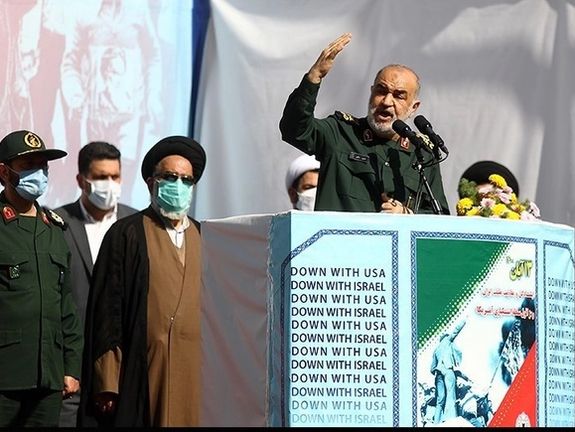
Many Iranians, however, have been very skeptical of the official account. They suspect the government of complicity with ISIS in the attack, to create its own narrative and martyrs to divert attention from fierce antigovernment protests.
The suspicion was partly due to the coincidence of the shooting with the 40th-day memorial for Mahsa Amini for which the opposition planned large widespread protests. Many also said this could be an excuse for blaming protesters for causing insecurity and justifying harsher suppression of their movement.
The author said some members of a terrorist group which was behind the Shiraz shooting had been arrested “several weeks before” with 18 kilos of explosives and recounted a rumor “in some political circles” about Salami’s decision to sack the IRGC commander of Shiraz.
He added, in different font, that the decision is believed to have been taken “because IRGC had prior knowledge of the attack on Shahcheragh”. The metadata of the document created November 11 indicates that this sentence was added by the author himself and was not a later addition by someone else.
The author of one of these secret documents wrote that the shooter, a citizen of Tajikistan, was taken down by an IRGC security agent who “happened to be present there for prayers.” The agent took his weapon from the lockers at the security gate, after hearing the shots, and rushed to encounter the shooter, he wrote, adding that the shooter had been to Afghanistan twice and taken the oath of loyalty to ISIS. He also wrote that even a police team that arrived at the shrine after the shooting had only been in the area for another operation.
According to the same document, the shooter was helped by an Afghan citizen residing in Tehran who stayed out of the shrine during the shooting and claims he was arrested in Tehran adding that the commander of the operation, a citizen of the Republic of Azerbaijan who had entered Iran legally on a visa, was also arrested on his way to Tehran.
According to another document also prepared for Salami’s attention, it has been claimed that the intelligence ministry had identified the Afghan member of the group who was arrested in Tehran “on the day of the incident” but did not announce the news “to gather more intelligence on the group.”
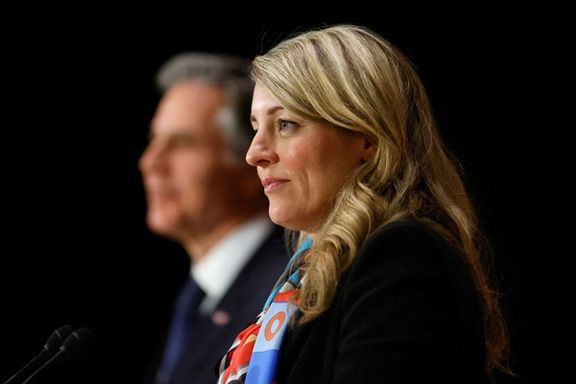
Canada has extended its list of sanctions on the Islamic Republic’s officials over the regime’s human rights violations such as denial of women’s rights and crackdown on protests.
In a statement issued on Friday, Foreign Minister Mélanie Joly announced that Canada is imposing additional sanctions under the Special Economic Measures (Iran) Regulations.
The additional sanctions target four individuals and five entities that Ottawa said were tied to Tehran's "systematic human rights violations" and actions that "threaten international peace and security."
“Despite the Iranian regime intensifying efforts to brutally repress demonstrations across the country, the people of Iran continue to stand up for the rights of Iranian women and girls, and a better future for all Iranians,” read the statement, adding that "Canada will not stand idly by while the regime’s human rights violations increase in scope and intensity against the Iranian people."
The new list included a Revolutionary Guard commander Morteza Talaei, who was also former Commander of Tehran’s police; Ali Ghanaatkar Mavardiani, a senior judge, prosecutor and interrogator of the regime who used to work in Evin Prison Court; and Hassan Karami, Commander of the Islamic Republic’s Law Enforcement Forces Special Units.
The new blacklisted entities include Safiran Airport Services, a cargo and commercial airline that has coordinated military flights between Iran and Russia, sending lethal Iranian-made Unmanned Aerial Vehicles (UAVs) to Russia. Another is Baharestan Kish Company, a subsidiary firm of the IRGC Cooperative Foundation that has entered into agreements with the Basij paramilitary forces to develop Shahed-series UAV components. Canada also sanctioned Javan News Agency, a media outlet under the Basij that disseminates anti-Semitic messaging and the Iranian regime’s propaganda.
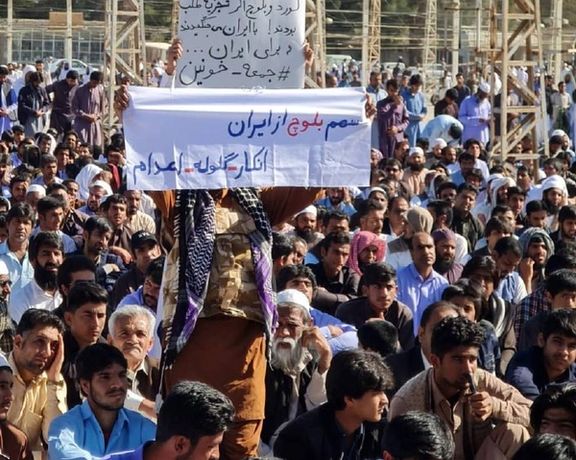
People turned out in large numbers in Iran’s Sunni city of Zahedan Friday to show support for their religious leader Mowlavi Abdolhamid who has been defying the regime.
Residents of several cities Sistan-Baluchistan Province, including its capital Zahedan, held demonstrations after Friday prayers as they have done since unrest began in mid-September in Iran. The protesters are especially enraged over a recently leaked document that revealed Supreme Leader Ali Khamenei has ordered his officials to defame Abdolhamid, the most prominent religious leader of Iran's largely Sunni Baluch population living in the province.
Earlier this week the hacktivist group Black Reward breached the data servers of Fars news agency, affiliated with the Islamic Republic's Revolutionary Guard, and released several documents indicating that Khamenei is dismayed by Abdolhamid’s remarks, who has been critical of Iran’s autocrat for the indiscriminate crackdown on protests in the province and elsewhere.
Relations between Abdolhamid and the government became tense after security forces opened fire on demonstrators in Zahedan September 30, killing more than 80 people.
In addition to Zahedan on Friday, protesters in Chabahar, Khash, Iranshahr, and Zahak, chanted slogans such as "Sheikh-ul-Islam (Abdolahamid) is with God, Khamenei is disgraced,” “Salute to Mowlavi, Death to Khamenei,” and “With Hijab or without hijab, moving towards revolution.”
According to videos posted on social media, security forces clashed with protesters in Zahedan and used teargas to disperse the gathering.
During his Friday prayer sermon earlier in the day, Abdolhamid decried the torture of detained protesters and warned the Islamic Republic against issuing verdicts that call protesters mohareb (muharib), which means warrior in Arabic. In Iran’s Islamic law the term means ‘enemy of God’ which carries the death penalty.
"A prisoner is a captive. Beating, insulting, cursing and assaulting him is against the teachings of Imam Ali (the first Shiite imam), Ahl al-Bayt (the family of Islam’s Prophet Muhammad), Hazrat Rasool (Prophet Muhammad) and Islam. The dissidents and critics should be treated in an Islamic manner,” he emphasized.
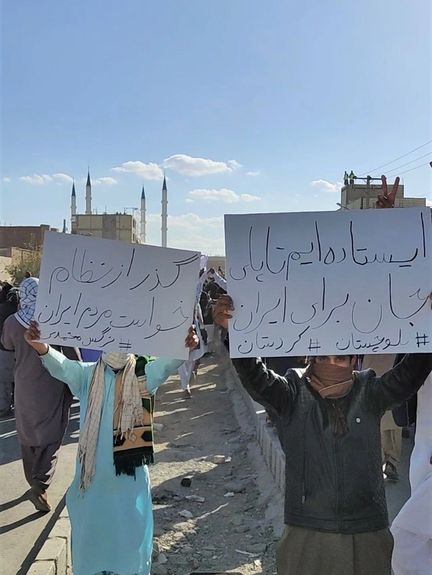
Abdolhamid went on to say that the nation has endured problems for 44 years, now they are protesting, insisting that their protests should not be a pretext to execute them. He said that their demands are legitimate, adding, "We want our country to be safe and united. We don't have Shiites, Sunnis or ethnic groups here. We are all Iranians. From Zoroastrians and Dervishes to Baha’is. They are also human and Iranian, and their rights should be respected…If an American or an Israeli speaks the truth, it is still the truth," he said.
Dervishes of the Gonabadi order are among religious groups seen as potential security threats in Iran, and are regularly persecuted by the regime. Baha'is, who number around 300,000 in Iran, also say their rights are systematically violated and they are often harassed, forced to leave their homes and businesses, and are deprived of government jobs and university education. Khamenei has on several occasions called the Baha'i faith a cult and in a religious fatwa in 2018 forbade contact, including business dealings, with followers of the faith.
Referring to the recent leak and the regime’s efforts to tarnish his image, Abdolhamid said "If the reign and power are in your hands, it was God's will. If we have respect and love of people, it is also a God's gift. What God gives, only He can take back. God gives honor and takes it away. No one else can take someone’s honor."
Abdolhamid's popularity is largely because of his willingness to challenge Khamenei’s absolute power. Earlier in November, the outspoken Sunni Imam said women, ethnic and religious groups have faced discrimination after the establishment of the Islamic Republic in 1979.
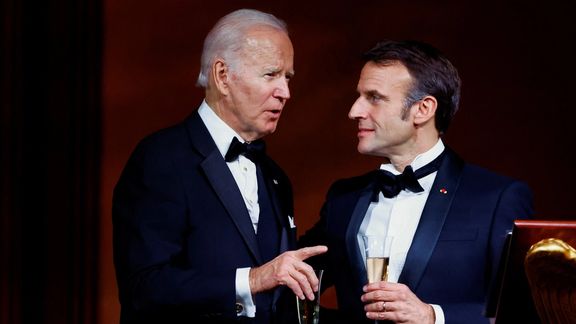
A joint statement marking French President Emmanuel Marcon’s visit to the White House expressed “respect for the Iranian people, in particular women and youth.”
With an array of celebrities at a red-carpeted state dinner Thursday, Secretary of State Antony Blinken told France 2 TV he would support the French team if the United States were knocked out of the World Cup. The joint presidential statement called France the US’s oldest ally.
The two countries were at one in supporting global human rights and in Middle East policy, the presidents’ statement said. This included a “just solution to the Syrian conflict,” where US troops remain in the north east, backing the Abrahamic Accords, by which some Arab states have recognized Israel ahead of Palestinian statehood, and a determination that “Iran can never develop or acquire a nuclear weapon.”
While the statement expressed commitment to “democratic values,” respect for international law, and international cooperation to address Iran’s “nuclear escalation,” the Washington political mood is increasingly polarizing the US and western Europe on one side, against Iran, China, and Russia on the other.
Republicans and Democrats are vying to push harder. Senator Mario Rubio, an advocate of more US weapons for Israel, Wednesday demanded that President Joe Biden look into whether the Chinese tech company Tiandy’s involvement in Iran “raises serious questions about whether its products are being used against peaceful Iranian protesters.”
‘Barbaric treatment’
In a 20-minute interview for CNN, former secretary of state Hillary Rodham Clinton envisaged US foreign policy as a struggle for women’s rights. Highlighting violations by Russia, Iran and the Afghan Taliban, Clinton called for an “absolute rejection of using sexual attack as a weapon of war,” for holding leaders accountable for “barbaric treatment,” and for stepping up sophisticated arms supplies to Ukraine, including from Israel, whose new government needed to understand “Iran and Russia have made an alliance.”
Clinton explained her approach as secretary of state to protests in Iran after the disputed 2009 presidential election as due to intelligence assessments that “overt American support would actually hurt” and that “behind the scenes” activity was better. “Now it’s very different, what’s happening now deserves our full-throated support,” she said.
“I would not be negotiating with Iran on anything right now, including the nuclear agreement,” Clinton continued. With the US withdrawal in 2018 from the 2015 Iran nuclear agreement, “that horse is out of the barn,” she said, while the International Atomic Energy Agency (IAEA) had lost its “eyes” on Iran’s nuclear program as Tehran reduced the agency’s access in response to US sanctions and attacks on its atomic sites.
Clinton suggested that maintaining US ‘maximum pressure’ sanctions was to force “regime change” but rather to spark “internal discussions” in Iran, “not just [within] the government … but [within] the clerics.” This tied in with Rob Malley, the White House special envoy for Iran, telling Foreign Policy magazine in an interview this week that “the Iranian system is divided.”
‘Active diplomatic track’
The Biden administration’s approach is not without critics. Much of the ‘global south’ is increasingly wary of US ‘exceptionalism,’ accusing the US of hypocrisy and double standards. The US-France presidents’ statement expressed support for the International Criminal Court, which Washington has refused to join. Both India and Pakistan abstained on the recent US-sponsored resolution condemning Iran at the IAEA governing board. South Africa and Brazil are among those refusing to take sides over Nato and Ukraine.
Nor is opposition to talks with Iran unanimous, in the US or Europe. In the Washington Post Thursday, Ellie Geranmayeh, of the European Council on Foreign Relations, argued for “an active diplomacy track to reverse Iran’s nuclear conduct before it is too late.” Rejecting the case for more and more sanctions, she argued there was “little evidence” they had worked, since Iran had “escalated its behavior” in response.
“It is irresponsible to risk everything on the hope that a peaceful transition of power will place Iran’s nuclear program under democratic and safe control anytime soon,” Geranmayeh wrote.
But the issue now is not just nuclear escalation. It is also the deadly violence the Islamic Republic is using against antigovernment protesters, which leaves little room for sanctions relief. More than 450 protesters have been killed since mid-September while several have been sentenced to death.
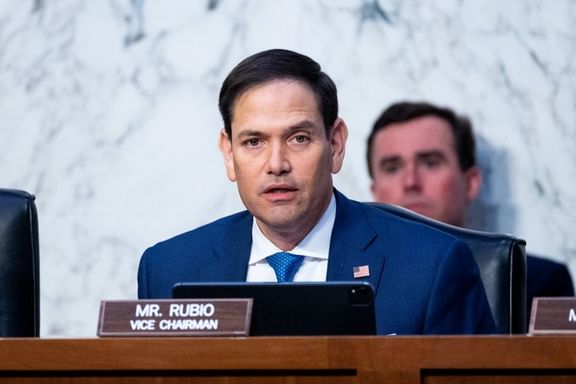
US Republican Senator Marco Rubio has asked the White House to look into reports that a Chinese firm is supplying Iran with technology that can be used against protesters.
NBC news has reported that Tiandy, which is providing facial recognition technology to the Chinese authorities is also equipping the Iranian government with surveillance technology.
Sen, Rubio sent a letter to the Biden administration November 30, obtained by NBC, that the company’s dealings with Iran “raise serious questions about whether Tiandy’s products are being used against peaceful Iranian protesters.”
Human rights organizations say that Iran has killed more than 450 protesters since mid-September and imprisoned thousands, sentencing more than a dozen to death.
The company’s website shows that it has sold equipment to Iran’s notorious Revolutionary Guard and other security agencies, while Intel Corp. lists Tiandy as a partner providing its processors for some of the Chinese firm’s video recording equipment.
Sen. Rubio has asked the State, Treasury and Commerce departments to see if Tiandy has violated US laws against assisting organizations violating human rights.
“I request that you determine and report to the Congress whether Tiandy has engaged in conduct that may meet the criteria for designation pursuant to the authorities provided by Congress,” Rubio wrote.
While several Chinese surveillance firms are under US sanctions, Tiandy is not one of them. Experts say the company is one of the most dangerous among similar Chinese firms.